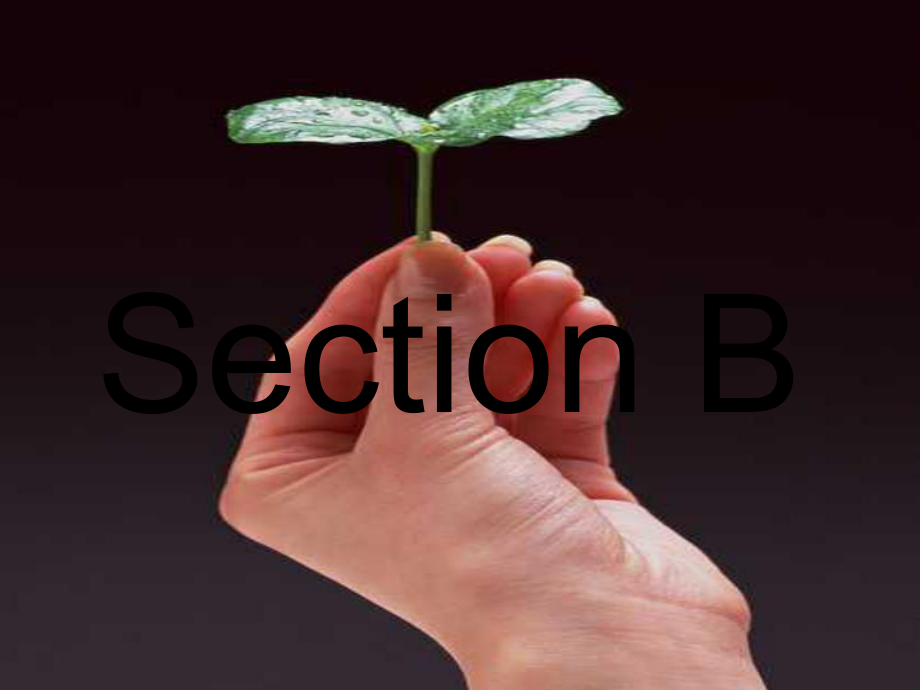《九年級(jí)英語(yǔ)Unit2 Topic 3 Section B 2課件仁愛(ài)版》由會(huì)員分享�����,可在線(xiàn)閱讀��,更多相關(guān)《九年級(jí)英語(yǔ)Unit2 Topic 3 Section B 2課件仁愛(ài)版(29頁(yè)珍藏版)》請(qǐng)?jiān)谘b配圖網(wǎng)上搜索���。
1��、Section BWhat should we do if we want to be a greener student? We should reduce the waste we produce. We should reuse plastic bags.Reduce waste.Dont buy cups or boxes which people can use only once.Save electricity.Turn off the lights when you are not using them.Grow fruit and vegetables yourselfSav
2�、e energy when you travel.Give old clothes to the poor to reuse them.Cover all pans when you are cookingWhy does Jane suggest that Michael had better walk or ride a bike instead of taking a bus or a taxi?It will save energy and reduce air pollution.Would you like to be a greener person?green不單純指不單純指“
3��、顏色顏色”��,也可���,也可借這種顏色來(lái)代指保護(hù)環(huán)境的人��。借這種顏色來(lái)代指保護(hù)環(huán)境的人��。例如:例如:Youre pale green.你剛剛成你剛剛成為綠色衛(wèi)士為綠色衛(wèi)士/使者�。使者。You ought to turn off the lights when you leave a roomought to此名是由此名是由 when when 引導(dǎo)的時(shí)間狀語(yǔ)從句��。引導(dǎo)的時(shí)間狀語(yǔ)從句�����。Ought to Ought to 情態(tài)動(dòng)詞����,無(wú)人稱(chēng)和時(shí)態(tài)變化,后接動(dòng)詞原形����,情態(tài)動(dòng)詞,無(wú)人稱(chēng)和時(shí)態(tài)變化��,后接動(dòng)詞原形��,意為意為“應(yīng)該�����,應(yīng)當(dāng)應(yīng)該�����,應(yīng)當(dāng)”�����。e.g.Wee.g.We ought to be polite t
4�����、o the ought to be polite to the old.old.我們應(yīng)該尊敬老人���。我們應(yīng)該尊敬老人���。否定形式為:否定形式為:ought not to do sth.=oughtnt to do sthought not to do sth.=oughtnt to do sth. .不應(yīng)該做某事。不應(yīng)該做某事�����。e.g.Youe.g.You ought not to tell her the bad ought not to tell her the bad news.news.你不應(yīng)該告訴她這條壞消息���。你不應(yīng)該告訴她這條壞消息���。一般疑問(wèn)句形式為:一般疑問(wèn)句形式為:ought+ou
5���、ght+主語(yǔ)主語(yǔ)+to do sth+to do sth. .,肯定回答用�,肯定回答用Yes,Yes,主語(yǔ)主語(yǔ)+ought+ought,否定回答用�,否定回答用NoNo,主語(yǔ)����,主語(yǔ)+ought not+ought not。e.g.Oughte.g.Ought we we to go there?to go there?我們應(yīng)該去那嗎����?我們應(yīng)該去那嗎?Yes,youYes,you ought. ought.是的����,應(yīng)該。是的���,應(yīng)該���。/No,you/No,you ought not. ought not.不���,不應(yīng)該。不�����,不應(yīng)該�。turn off turn off 意為意為“關(guān)閉關(guān)閉”�����,多用關(guān)掉家用電器
6��、�;,多用關(guān)掉家用電器���;turn up turn up 意為意為“把(音量)調(diào)大把(音量)調(diào)大”��;turn down turn down 意為意為“把(音量)調(diào)小把(音量)調(diào)小”��;turn on turn on 意為意為“打開(kāi)(家用電器)打開(kāi)(家用電器)”����。Will you turn on the radio? Will you turn on the radio? 你打開(kāi)收音機(jī)好嗎?你打開(kāi)收音機(jī)好嗎���?Turn off the light before you leave.Turn off the light before you leave.離開(kāi)前請(qǐng)把燈關(guān)掉�����。離開(kāi)前請(qǐng)把燈關(guān)掉�����。Please t
7��、urn down the television a little.Please turn down the television a little.請(qǐng)把電視機(jī)的聲音關(guān)小一點(diǎn)���。請(qǐng)把電視機(jī)的聲音關(guān)小一點(diǎn)。She sat down and turned up the radio.She sat down and turned up the radio.她坐下來(lái)���,把收音機(jī)音量開(kāi)大�����。她坐下來(lái)���,把收音機(jī)音量開(kāi)大�。事實(shí)勝于雄辯�。(諺語(yǔ))說(shuō)起來(lái)容易做起來(lái)難。(諺語(yǔ))Actions speak louder than words.Easier said than done.Love me ,love my do
8�����、g.愛(ài)屋及烏When the cat is away,the mice will play.貓兒不在����,老鼠玩的自在���。(意指山中無(wú)老虎�,猴子稱(chēng)霸王)Never offer to teach fish to swin.切勿教魚(yú)游泳�����。(意指不要班門(mén)弄斧)提建議的句型有:1��、You ought to2��、Youd better3����、Dont4�����、You can do sth.5�、You should6���、PleaseOur class will take part in the activity.take part intake part in 參加�����,參與�����。e.g.About 400 students too
9��、k part in the protest.大約400名學(xué)生參加了抗議活動(dòng)�����。join 加入(政黨或組織)���。e.g.join the Party 入黨。Tomorrow is Beach Clean-up Day.明天是海灘清潔日。clean-up 名詞清掃��;清除(污染物)�����;清理Clean-upThe clean-up starts at 9:30 a.m. and finishes in the afternoon.一般現(xiàn)在時(shí)可用于指將來(lái)���,表示意圖�,打算���,計(jì)劃等近期內(nèi)發(fā)生的事情或動(dòng)作。這樣使用的動(dòng)詞有:arrive, begin, come, start, end, leave, go, re
10���、turn, finish, open 等����。startfinishPlease be on time.on timeon time 按時(shí)����,準(zhǔn)時(shí),表示在事先安排或規(guī)定的時(shí)間內(nèi)���。e.g.Please finish your homework on time.請(qǐng)按時(shí)完成作業(yè)���。in time 及時(shí)�����,表示還有足夠的或多余的時(shí)間���。e.g.Please get to the station in time,or well miss the train.請(qǐng)及時(shí)到達(dá)車(chē)站,否則我們將錯(cuò)過(guò)這列火車(chē)�。Make sure you go to bed early tonight.Make sureMake sure of
11、/ about / to do/ 從句���,弄清楚�,確定�,查明。此句you go to bed early tonight 作的是make sure 的賓語(yǔ)從句���。e.g.Make sure of the time and place.弄清時(shí)間和地點(diǎn)����。Make sure to turn off the gas before you go out.出門(mén)前一定要關(guān)掉煤氣�����。When you go to school,make sure you have had breakfast.上學(xué)之前,一定要吃早餐����。Plan your own Clean-up Dayownown pron.自己的,of ones o
12�、wn屬于某人自己的。e.g.I saw it with my own eyes.我親眼看見(jiàn)的��。She has a mind of her own.她頗有主見(jiàn)��。own v.擁有�,有。e.g. Who owns the dog?誰(shuí)是這條狗的主人���?Have your own Clean-up Day and sort the garbage you got into groups.soft drink cans waste paper lunch boxesplastic bottles batteries paper bags and cupsreused recycledreducedother
13���、splastic bottleslunch boxespaper bags and cupssoft drink canspaper bags and cupsbatteries1�����、You ought to get up early in the morning(改為否定句) You oughtnt to get up early in the morning.2�、This is a nice house. It hasnt got a garden(合為一個(gè)并列句) This is a nice house, but it hasnt got a garden.3�����、I want to sta
14��、y at home. I dont want to go shopping.(合并句子)I want to stay at home instead of going shopping.4���、We should reuse clothes. (改為同義句)We shouldnt use clothes only once.5、Tom does housework every day. His sister does nothing.(合并為一個(gè)并列句) Tom does housework every day while his sister does nothing.1�、Im terribly
15、 sorry, I cant go hiking with you this Saturday. Its OK. We can go together next time. A. so B. but C. and D. or2�、Work hard, you wont do well in your lessons. OK. I will. A. and B. so C. or D. butBC1、Im not sure Mr.Wang goes to see his parents. Twice a week. A. how long B. how often C. how soon D. h
16�����、ow many2��、 spending our vacation in a hotel,why not try hiking in the country? OK. I will. A. Instead of B. Because of C. Thanks to D. As forBA1���、Throw away paper bags.2�����、Go to school by bike or on foot instead of catching a bus.3�����、Use both sides of a piece of paper.4�����、Spit in public places.5��、Throw away
17���、empty glass bottles.6�����、Collect rubbish for recycling.7���、Turn off all the lights when leaving the room.8、Wear man-made fur instead of real fur.9�����、Reuse plastic bags as many times as possible.10���、Draw pictures on public walls.11����、Cut down trees for making a new desk.12����、Pick up the rubbish and throw it into a dustbin.
 九年級(jí)英語(yǔ)Unit2 Topic 3 Section B 2課件仁愛(ài)版
九年級(jí)英語(yǔ)Unit2 Topic 3 Section B 2課件仁愛(ài)版

